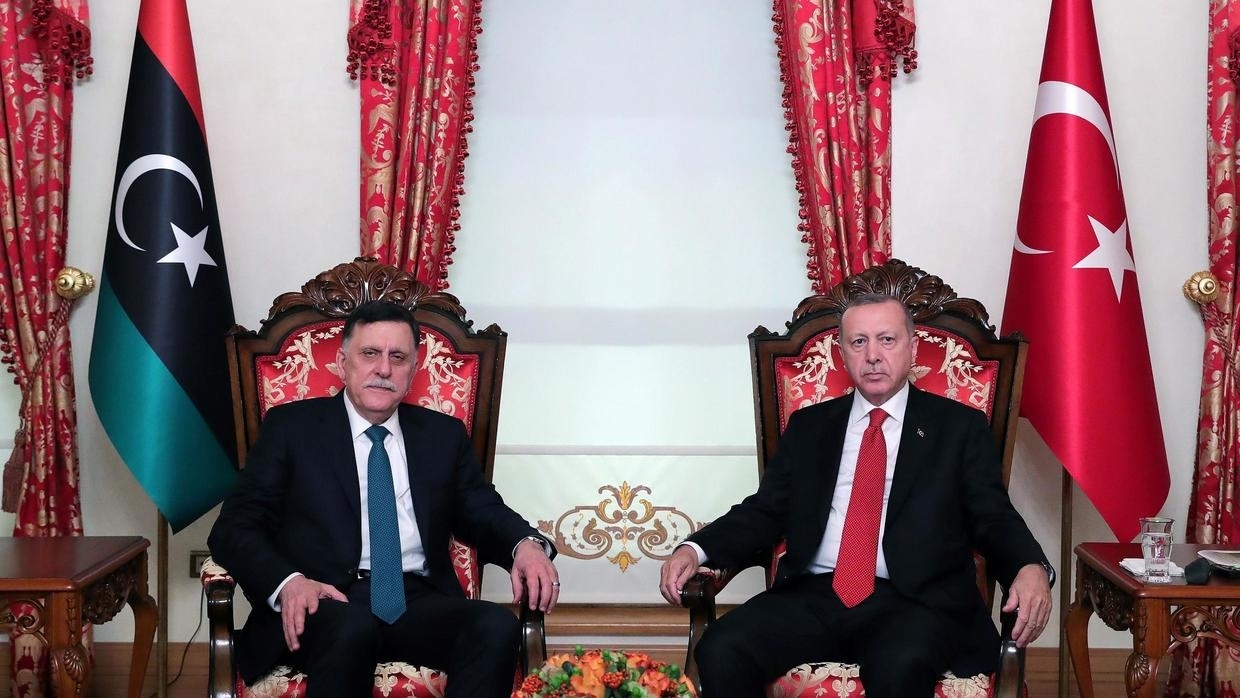LIBYA - A rebalancing act
January 9, 2020 | Expert Insights

Background
After the 2011 overthrow and killing of Muammar Gadhafi in a NATO-backed uprising, the once prosperous Libya has been torn apart by a bloody civil war. European powers who sowed the seeds of the revolution failed to bring it to a peaceful conclusion.
Since 2014, the country has been administered by two governments. The UN backs the Government of National Accord (GNA) in Tripoli under Prime Minister Fayez al Serraj which is supported by Turkey, Qatar and to a lesser extent by Tunisia and Algeria. In opposition is the Tobruk based Libyan National Army (LNA) of warlord Marshal Khalifa Haftara supported by UAE, Saudi Arabia, Egypt and Russia.
In recent months, Khalifa Haftar has been gaining ground. Already in control of Eastern Libya, Khalifa Haftar is reportedly ready to move on Tripoli. The LNA has advanced into Sirte, a strategic city in the centre of Libya’s Mediterranean coastline, and fighting has increased around Tripoli in recent weeks.
On Sunday, 05 January 2020, President Tayyip Erdogan of Turkey announced that military forces were being dispatched to support the besieged government, in Tripoli. This move has the support of the Turkish parliament.
Analysis
Apparently, this move is a part of the larger Turkish strategy for Libya as it came in the wake of a November military cooperation agreement the GNA permitting Turkish control over a critical part of the Eastern Mediterranean Sea. Turkey is likely to send a mixed military component comprising land, naval and air forces, to establish a military base at the port city of Misrata. Reportedly, two Turkish naval ships and a submarine are already deployed, off Libyan shores. Turkey has not yet officially announced the size of their expeditionary force; but President Erdogan said Turkish forces would be commanded by a Lieutenant General, who would be setting up an operations centre and would be involved with coordination and training.
Turkey has already provided drones and armoured vehicles for the defence of the capital, Tripoli, which helped quickly stall the offensive launched by Haftar’s forces nine months ago.
But Turkish backing has often been outweighed by air power from the United Arab Emirates in support of Haftar’s self-styled Libyan National Army (LNA), and by a technological and frontline edge provided by Russian military contractors since September, officials, diplomats and analysts say. The contract fighters belong to the Wagner Group, owned by a close associate of Putin. Marshal Khalifa Haftar’s forces receive direct support from UAE and Egypt.
Although Turkey and Russia have generally been on opposing sides in Syria’s civil war, they have strengthened economic and military ties recently. The procurement of S-400 Air Defence System from Russia against stiff US opposition has done much to get both countries to forget their mutual suspicion. They now cooperate in northeast Syria, where they mount joint patrols.
The Turkish initiative has been condemned by many countries, including the US. President Donald Trump reportedly told President Erdogan, in a telephone call, that foreign interference at this juncture, would only complicate the situation, in Libya. In fact, the US Embassy in Libya has called it a “toxic foreign intervention”. Egypt said the military intervention in Libya, was a matter of Egyptian national security and they would work towards defeating efforts, to control its neighbour. Israel, Greece and Cyprus have also issued a joint statement, warning against the Turkish military deployment. Turkey’s traditional enemies, Greece and Cyprus are especially worried as they fear that Turkey’s ultimate aim is to exploit the energy resources of the region at their cost.
Assessment
- The whole issue ultimately boils down to the exploitation of precious natural resources of a fractured country unable to manage itself. Libya’s oil reserves are estimated to be the largest in Africa; and, amongst the 10 largest, globally.
- The present move of Turkey has to be viewed in light of the contentious agreement between Turkey and Libya allowing the later access to the gas-rich waters of Mediterranean, hotly contested by Turkey’s arch enemy Greece.
- Erdogan’s larger strategy for the Mediterranean is ultimately to create suitable pressure that can extract concessions for the Turkish Cypriots during future negotiations on the final status of Cyprus and the distribution of its natural wealth.
- However, Turkey risks the danger of overreach. Its military has limited expeditionary capability and is already heavily committed in its Northern Syrian invasion and creation of the safe zone. The deployment is likely to take several weeks and its military effectiveness will then have to be assessed.
- Turkish forces will have to do most of the heavy lifting in keeping the LNA away from Tripoli as the GNA forces are fully stretched and have been struggling against missile systems being used to bring down drones and laser-guided shells introduced by the Russian contractors.
- Russia could be eyeing a long-term goal of having a naval base in eastern Libya and extending its influence in the vacuum with the departure of US and its NATO allies from the region. This gap could well be filled jointly by Ankara and Moscow.
Image Courtesy: france24.com








Comments